Puppy socialization is not just about exposing puppies to people and dogs, as some may think. Rather, puppy socialization stimulates the five senses of a young dog. It is the introduction, exposure and desensitization to the sights, sounds, smells, tastes and touch of everyday life. The socialization period conditions a puppy to the many different situations he needs to be familiar with and comfortable around. It also prepares him to deal in an appropriate manner with the new experiences and challenges which inevitably arise throughout life.
The most critical period of socialization for a young puppy is between 8 and 16 weeks of age. But earlier socialization is also very important and begins with the breeder.
Early socialization - birth to 2 months
Our puppies are raised in our home and are integrated into our everyday lives. They start out in a whelping box in a quiet bedroom. They receive constant supervision during their first week of life and are monitored frequently for the next couple of weeks. At about 3 to 4 weeks of age the puppies are moved to an x-pen in our breakfast area, where they are exposed to the sights and sounds of family life. We handle, cuddle, and stimulate our puppies throughout each day.
Some of the socialization stimulation we provide the puppies we breed:- People - We handle the puppies daily and when they are at least 3 weeks old we invite a variety of people in to meet and handle them.
- Animals - After they are at least 3 weeks old the puppies will interact with our dogs and cats.
- Objects - The puppies will be introduced to a variety of different objects, such as boxes, bags, pans, toys, etc.
- Noises - Once they are moved from their whelping box to an x-pen near the kitchen, they will be exposed to the sounds of everyday life... cabinet doors closing, dishes rattling, furniture moving, dishwasher swishing, vacuum cleaner roaring, people talking and laughing, dogs barking, etc.
- Surfaces - They will learn to negotiate slippery floors, rough concrete walks, and uneven sloping terrain.
- Grooming - The puppies will be brushed, bathed, have nails clipped, and be exposed to grooming shears.
Check out photos of people handling puppies from one of our previous litters.
(Click on any thumbnail to open the full-size photo; Scroll through the gallery by clicking on the left or right side of each photo.)

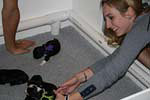
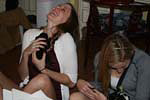
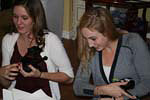

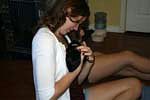
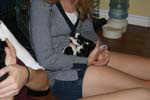
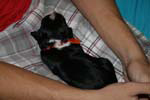
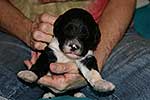




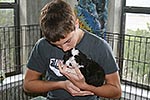
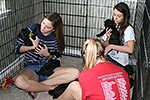
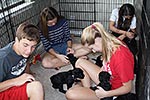
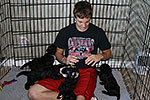


Young puppy socialization - 2 months to adolescence
Until the puppy has acquired sufficient active immunity, it is too risky to allow her to socialize with dogs of uncertain immunization history, or dogs that have been in contact with the urine and/or feces of potentially infected dogs. Instead, during this time, concentrate fully on socializing the puppy to people.
Once the puppy has had at least two shots in the series of puppy shots, start taking her on walks. It is also the time to enroll the pup in puppy play groups and puppy training classes.
Older puppy socialization - adolescence
The beginning of dog adolescence is an abrupt and cataclysmic period of change. It starts as early as 18 weeks, but more commonly around 6 or 7 months. This is another very critical period for socialization. A puppy's lack of confidence may rear its ugly head as fearfulness and/or aggression to other dogs or people. It is important to continue socializing and training throughout adolescence to help your dog deal with the turmoil that comes with changing hormone levels. If a puppy's early education was insufficient, it is extremely important to enroll her in a class right away and nip any problems in the bud. Otherwise, the problems will get worse as the dog grows older.
Puppy socialization is important but, in reality, socialization should never end. When socialization continues, dogs become even more socialized, whereas when socialization is discontinued (e.g., when dogs are kenneled, or not taken out and about regularly), dogs gradually de-socialize until eventually they may become fearful, asocial, or even antisocial.